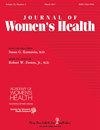产前诊所调查孕妇和男性伴侣对妊娠相关健康风险的认识
IF 3
3区 医学
Q1 MEDICINE, GENERAL & INTERNAL
引用次数: 5
摘要
背景:低估妊娠相关的健康风险可能损害知情决策,减少孕前护理的需求。我们评估了孕妇和男性伴侣对怀孕带来的几种健康风险的了解情况,以确定生殖健康素养方面的潜在差距。材料和方法:在加利福尼亚州托伦斯港-加州大学洛杉矶分校医学中心的产前诊所,用英语或西班牙语调查孕妇及其男性伴侣对与妊娠相关的七种常见健康风险(静脉血栓栓塞(VTE)、糖尿病、胆结石、痔疮、高血压(HTN)、肾脏感染和贫血)的了解情况。结果:女性的有效率估计为66%,男性为85%。在285名答复者中,5.0%的妇女和5.6%的男子能够正确报告怀孕期间所有七种健康风险都增加了。总体而言,30.6%的女性和24%的男性认识到怀孕增加了三种最严重疾病(静脉血栓栓塞、糖尿病和HTN)的风险。虽然高等教育与对这三种严重风险的更高认识有关,但大多数受过最高教育的人错误地报告说,这些风险在怀孕期间减少或保持不变。年龄、胎次、语言、性别和胎龄对研究结果没有影响。总体而言,77.9%的受访者认为口服避孕药对女性健康的危害大于怀孕。结论:接受调查的孕妇和男性伴侣对与怀孕有关的常见和严重健康危害的知识严重不足,这可能妨碍妇女对其生殖健康选择作出知情选择的能力。本文章由计算机程序翻译,如有差异,请以英文原文为准。
Awareness of Pregnancy-Associated Health Risks Among Pregnant Women and Male Partners Surveyed in a Prenatal Clinic.
Background: Underestimation of pregnancy-associated health risks could compromise informed decision-making and reduce demand for preconception care. We assessed the knowledge of pregnant women and male partners about several health risks posed by pregnancy to identify potential gaps in reproductive health literacy. Materials and Methods: Pregnant women and male partners were surveyed about their knowledge of seven common health risks associated with pregnancy (venous thromboembolism [VTE], diabetes, gallstones, hemorrhoids, hypertension [HTN], kidney infection, and anemia) in either English or Spanish in a prenatal clinic at Harbor-UCLA Medical Center in Torrance, California. Results: The response rate for women was estimated to be 66% and was 85% for men. Of the 285 respondents, 5.0% of women and 5.6% of men were able to correctly report that all seven health risks increased during pregnancy. Overall, 30.6% of women and 24% of men recognized that pregnancy increased the risks of the three most serious conditions (VTE, diabetes, and HTN). While higher education was associated with a higher awareness of these three serious risks, the majority of individuals with the highest education nonetheless incorrectly reported that these risks were reduced or unchanged in pregnancy. Age, parity, language, gender, and gestational age did not impact study findings. Overall, 77.9% of respondents rated oral birth control pills more hazardous to a woman's health than pregnancy. Conclusions: Surveyed pregnant women and male partners have significant knowledge deficiencies concerning common and serious health hazards associated with pregnancy that may hamper women's ability to make informed choices about their reproductive health options.
求助全文
通过发布文献求助,成功后即可免费获取论文全文。
去求助
来源期刊

Journal of women's health
医学-妇产科学
CiteScore
6.60
自引率
5.70%
发文量
197
审稿时长
2 months
期刊介绍:
Journal of Women''s Health is the primary source of information for meeting the challenges of providing optimal health care for women throughout their lifespan. The Journal delivers cutting-edge advancements in diagnostic procedures, therapeutic protocols for the management of diseases, and innovative research in gender-based biology that impacts patient care and treatment.
Journal of Women’s Health coverage includes:
-Internal Medicine
Endocrinology-
Cardiology-
Oncology-
Obstetrics/Gynecology-
Urogynecology-
Psychiatry-
Neurology-
Nutrition-
Sex-Based Biology-
Complementary Medicine-
Sports Medicine-
Surgery-
Medical Education-
Public Policy.
 求助内容:
求助内容: 应助结果提醒方式:
应助结果提醒方式:


